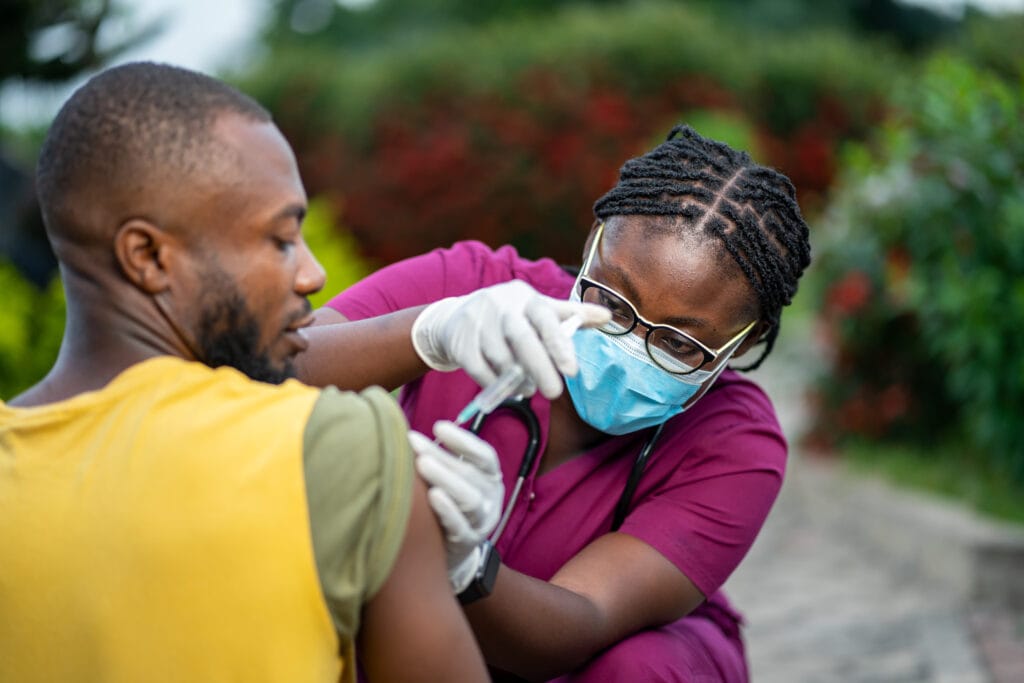Ghana is not perfect. Most people consider moving there not because it is flawless, but because it offers a breath of fresh air from the pressures of the Western world. The truth is that nowhere is perfect and neither is Ghana. But just because there are real problems in Ghana doesn’t mean you should abandon your plans.
Many of us in the diaspora feel a deep pull to Ghana. The rich culture, warm people, connection to the land, and spiritual bond with Africa make it more than just a destination—it feels like home. I’ve walked along the dirt roads and felt the peace of being grounded in something ancient and powerful. But I’ve also come face-to-face with the challenges.
If you’re planning a move to Ghana, prepare both your heart and your mind. Ghana is beautiful, yes. It’s welcoming and full of promise. But the problems in Ghana are real—and if you’re not aware, they can leave you disappointed or caught off guard.
So before you pack your bags and book that one-way ticket, let’s talk—plain and clear—about what you should know.
1. Electricity Can Be Unreliable
One of the first things you’ll notice when you move to Ghana is the inconsistent power supply. You’ll experience some kind of electricity downtime almost every week. But if you plan around it and adjust your mindset, it wont be too much of a big issue for you. Personally, I’ve experienced it often enough, but honestly—it hasn’t bothered me too much.
Known locally as “dumsor” (literally meaning “off and on”), this inconsistent electricity is one of the well-known and long-standing problems in Ghana. Power outages can strike without warning and last anywhere from a few minutes to several hours—or even days, depending on where you live.
This affects everything, from running a business to simply getting a good night’s rest. If you’re coming from a country where electricity is stable, this will take some getting used to. You can do like a lot of people and invest in backup generators, inverters, or solar power to stay ahead of the disruptions.
2. An Inconsistent Water Supply Is Among The Problems In Ghana

Another critical issue is water. In some areas—especially outside the major cities—the water supply isn’t guaranteed daily. You might go for days without running water. If you’re not prepared, this can be a huge inconvenience. Buckets become your best friend. Water storage tanks and filters are wise investments if you’re planning to stay long-term.
Again, the beauty of Ghana isn’t in the convenience—it’s in the resilience, and the way people adapt and still thrive. I was speaking to my mom some time ago, and we were discussing the consistent water supply in places like the USA and Canada.
Yet, is an inconsistent water supply enough to make a decision about moving to Ghana?
3. Healthcare System Has Gaps

Access to healthcare in Ghana is improving, but it still has a long way to go. Public hospitals often face long queues, shortages of equipment, and limited resources. Private hospitals offer better service, but they can be expensive. One of the real problems in Ghana is that emergency services aren’t always reliable, especially in rural areas. You can’t just call 911 when you feel sick and they show up in 5 minutes.
If you have ongoing health conditions or need regular care, plan ahead. Get medical insurance. Build relationships with trusted health professionals. And always keep an emergency plan in mind.
4. Bureaucracy Can Be Frustrating
Trying to register land, open a business, or get official documents processed? Be patient. Bureaucracy in Ghana can be painfully slow. You might be sent from one office to another, told to “come back tomorrow,” or asked for unexpected fees.
One of the most frustrating problems in Ghana is this lack of urgency in some public sectors. Things move slowly, and it can feel like you’re going in circles. But again, if you come prepared—with the right documents, an honest helper, and plenty of patience—you can make progress.
5. Cost of Living Isn’t Always Cheap
There’s a myth that moving to Ghana means everything is cheaper. But that’s not entirely true. Some good, especially Import ones, are just as expensive. Rent in popular areas like Accra, especially for diasporans, can be shockingly high. Even local produce and transportation costs have increased significantly in recent years.
You’ll need to budget wisely. If you’re earning in dollars or pounds and spending in cedis, you’ll be okay—for a while. But the cedi fluctuates often. Inflation is real. The problems in Ghana’s economy can eat away at your savings faster than you think.
6. Land Issues Are Tricky

Buying land in Ghana can be a dream—or a nightmare. Too many people have bought land only to find out later that the seller didn’t actually own it, or worse—that the same piece of land was sold to multiple buyers. Land disputes are one of the serious problems in Ghana that many returnees and diasporans face.
When I moved to Ghana, I hit a hiccup of my own with land acquisition. My intention was to buy a piece of land to start a farm. I had made arrangements to view the land before I even booked my ticket. But when I got to Ghana, the situation was very different. Navigating land tenure issues, local chiefs, and the informal systems around ownership was a challenge. Still, it can be done—if you have the right local support and understand how the system works.
At the time of writing this blog, I’m still in the process of securing land for my farming operation. But I’ve learned a few key lessons along the way:
Always work with a reputable lawyer.
Do thorough checks with the Lands Commission.
Don’t rush.
As excited as you might be to build or invest, protect your peace of mind first. What looks like a great deal today can easily turn into a court case tomorrow if you’re not careful.
7. Internet Access Varies
Getting reliable internet in Ghana that compares to what you’re used to can be a challenge—but with the right guidance, it’s definitely possible.
I personally used a mobile bundle from Telecel that gave me 250 GB for 400 cedis. That amount kept me going for a few months before I had to renew. MTN also offers good packages, but you’ll need to shop around and see what fits your needs and area best.
If you work online, take note: not all areas have fast, stable internet. Some parts of Accra and other major towns have decent coverage, but in many areas, it can be hit or miss. Even rainy weather can affect your connection. Your experience will largely depend on your location and network provider—it can swing from amazing to frustrating within minutes.
Many remote workers and digital nomads invest in:
Mobile Wi-Fi routers
Multiple SIM cards from different networks
Having options helps. When one network fails, you can easily switch to another. Flexibility is your best friend if you rely on internet for work or communication.
8. Cultural Adjustment Is Real

You may be Ghanaian by blood, but if you’ve lived abroad most of your life, you’ll still go through a cultural adjustment. Social expectations, language, time management, and communication styles—these can be very different from what you’re used to.
In Ghana, time moves differently. People are generally more relaxed about punctuality and deadlines. One of the first things that frustrated me was how time is honored here. Unlike in the West, being “on time” doesn’t carry the same urgency. You might schedule a meeting for 10:00 AM, and by 12 noon, it still hasn’t started.
Understanding this is key to navigating it without stress. You’ll need patience and flexibility to keep your peace.
There’s also a strong emphasis on respect for hierarchy and community. In Ghana, elders are highly respected, titles matter, and collective decision-making often takes priority over individual choices. If you’re used to a more independent or fast-paced lifestyle, this will take some getting used to.
But it’s not a bad thing. It just takes humility and openness to adjust to the cultural etiquettes of this amazing country.
9. Corruption and Bribery Still Exist
This is a sensitive topic, but it’s true. Corruption is one of the long-standing problems in Ghana. From police checkpoints to government offices, you may encounter requests for “something small.” Some people consider it part of how things work.
You’ll need discernment. Sometimes, it’s best to walk away. Other times, you’ll have to navigate wisely to get what’s rightfully yours without compromising your values. Be vigilant, and keep your integrity intact.
10. Public Sanitation Needs Work
The truth is, not everywhere is clean. Some areas struggle with proper waste management. Gutters are often clogged with plastic, and littering remains a problem. Sanitation is one of those quiet but serious problems in Ghana that doesn’t get enough attention—yet it affects daily life, public health, and even the beauty of our surroundings.
But there is hope.
There are movements and individuals working hard to clean up communities, raise awareness, and push for change. Join them. Be part of the transformation. Whether you speak up, volunteer, or simply lead by example, your effort matters.
Don’t just move to Ghana to benefit—move to build. Let your presence be part of the solution.
11. Traffic and Road Safety
Driving in Ghana will test your patience—and your reflexes. Traffic in the cities, especially Accra, can be unpredictable. Cars cut across lanes, tro tros stop without warning, and motorbikes squeeze through tight spaces. Street lights might not work, and potholes are a regular sight. Road safety is still a big issue. If you’re used to strict road laws and organized driving, this will feel chaotic. You’ll need to slow down, stay alert, and keep your cool.
12. Scams and Petty Theft
Scams happen, especially if you look new or unfamiliar with how things work. Whether it’s land deals, overcharging for services, or someone just being too “friendly,” you need to stay alert. I’ve learned that in Ghana, trust must be earned slowly. Always double-check information, and don’t feel bad about saying no. Pickpocketing also happens in busy places, so keep your phone and wallet close. It’s not to scare you—it’s just wisdom. Be sharp, not scared.
So, Should You Still Move?
Absolutely. But move with your eyes wide open. Ghana is rich with opportunity, culture, and spiritual depth. It offers a kind of healing that you can’t always find elsewhere. But it also comes with weighty realities. These problems in Ghana don’t mean you shouldn’t come—they just mean you should come prepared.
Come with grace and patience and also a servant’s heart. And come with the commitment to be part of the solution, not just a beneficiary of the beauty.
Final Thoughts
The problems in Ghana don’t define her. They don’t erase her glory. But they do demand our honesty—and our effort. If you’re returning home, or making Ghana your new home, know that you’re stepping into something powerful. With the right mindset, you can thrive here.
Before coming, sit with these issues. Reflect on them. Decide if they’re things you can handle, because they will affect your daily life—from driving on the roads to eating at a local spot. These issues are currently a part of life in Ghana and you must decide if you are willing to work with them.
But remember this: you’re not just moving to Ghana. You’re becoming part of a nation still rising, still healing, still building. Bring your light. Bring your love. And bring your readiness to face the challenges with strength and wisdom.
Because in the end, the cracks are where the Light gets in.











